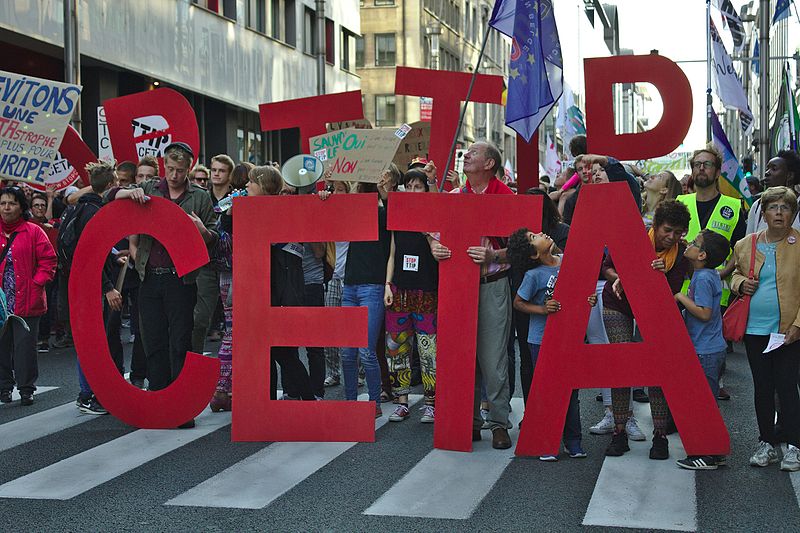Justin Trudeau travelled to Europe on February 16, 2017, to ratify the Canada-European Union Comprehensive Economic and Trade Agreement (CETA). He landed in France to address the full European Parliament, the first Prime Minister to do so. Trudeau’s remarks to the European Parliament signified the deepening of an international relationship between Canada and the European Union. Trudeau stated that we share ‘an important bedrock of common values’ and that CETA will ‘do what its best for its people’.
The European Parliament has voted in favour of CETA, and Canada will pass Bill C-30 and adapt provincial legislation in order to implement the treaty. About 58 percent of the 751-seat European legislature voted to ratify the deal on February 15, with 408 votes in favour, 254 against and 33 abstentions.
The agreement started in 2007 at the EU-Canada Summit with talks to increase bilateral relations between the two. Discussions of visa exemptions, military alliances and most importantly an increase in economic partnerships were also held. Prime Minister Stephen Harper was the main architect behind the CETA deal until 2015, when Justin Trudeau became Prime Minister. CETA was a goal for both the Conservative and Liberal parties, and the implementation of the deal will start in April, 2017.
What will CETA do?
CETA will eliminate or reduce 98 percent of tariffs and customs duties between Canada and the EU on almost all sectors, lowering prices for European goods in Canada. It will open up the Canadian and the EU markets to each other by recognizing international credentials from the EU, especially those in the engineering and architectural sectors. Canadian goods will reach a larger market in the EU, as goods from all provinces would be given preferential access.
In total, the agreement will streamline trade procedures, the agreement will create a broader market for goods from both entities, and establish similar certifications and standards for a variety of sectors. EU firms can also gain public contracts in Canada and more visa waivers will be issued. Canada will receive the same treatment, and be able to bid for contracts in industries in the EU. Both parties will recognize each other’s certifications in goods.
Dairy farmers were skeptical of the deal, since introducing European goods such as fine cheeses could disrupt local markets and result in losses for farmers. However, the dairy industry will not be included in the deal, and neither will audiovisual and transport services.
In terms of geopolitics, this bodes well for both the European Union and Canada. In the aftermath of Brexit, it is beneficial for the EU to connect with an established trade economy such as Canada. On the other side, Canada will have another solid market to rely on if the United States begins renegotiations of NAFTA in the future.
The Drawbacks of CETA
Opponents of the deal state that it gives too much power to private industries, as the agreement contains a proposal allowing courts to settle disputes between national governments and corporations. On the right, a main critic is Marine Le Pen, the leader of France’s National Front party, who voted “No” for the deal out of a concern that multinational corporations could fight against governments in court battles. Left-learning parties such as the NDP and the Green Party in Canada and the Green Party in France cited the same reasoning.
Anti-globalization protests were held outside the Parliament in Strasbourg, France against the deal. Dissenters held a lie-in in order to prevent the European Parliament from entering the building. Protestors state that it would hurt regional and national sovereignty in the EU, and that it would eliminate environmental and labour standards already in place.
For the average Canadian consumer, prices may rise in the prescription drug industry, because drug manufacturers will be given two more years of patent protection if the drug cannot be approved in time. This delays the production of generic versions of drugs and could force consumers to buy more expensive, brand drugs for some time. While Canadian farmers’ anxieties were quelled by the farm clause that was added to CETA, there will be a significant change in provincial legislation that may have Canadian citizens worried about sovereignty in their region. Provinces may fight CETA implementation, which can lead to a less effective trade pact in the future.
What Can We Conclude?
Will CETA be good or bad, and for whom? It is uncertain. The main goal for the two entities has been fulfilled: the joining of two major economies into a trade pact that cushions the blow of other countries choosing isolationism over globalism. For ordinary Canadian and EU residents, there are a variety of factors that make it difficult to determine whether CETA will be detrimental or beneficial for the average citizen until implementation is complete.
Photo: Protest in Brussels against the TTIP and CETA free trade agreements (2016), by Antoine Motte dit Falisse via Wikimedia Commons. Licensed under CC BY-SA 4.0.
Disclaimer: Any views or opinions expressed in articles are solely those of the authors and do not necessarily represent the views of the NATO Association of Canada.




